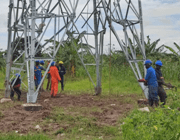The Ugandan Parliament has approved a request for government to borrow up to $331.5 million, from the International Development Association of the World Bank Group, upon which it will obtain a grant worth $276.5 million. The loan is for financing the Electricity Access Scale Up Project (EASP), whose aim is to increase access to electricity nationwide.
While presenting loan request to Parliament, the Minister of State for Planning, Hon. Amos Lugoloobi, said the EASP envisages an increase in access to electricity from the current 19 percent to 44 percent by 2027.
“In this, the project forecasts an increase in the number of connections annually from the current average of 70,000 to 300,000 connections,” said Lugoloobi.
Lugoloobi added that the loan is expected to increase the share of clean energy usage for cooking from 15 to 40 percent by 2027.
He said that the project will be equitable as it will include the disadvantaged communities in its beneficiaries. “The project will benefit households, commercial enterprises, industrial parks, public institutions. It will support refugees and host communities and women,” Lugoloobi said.
He further stated that the Ministry of Energy and Mineral Development and the Uganda Energy Credit Capitalization Company (UECCC) will be the main project implementing partners.
The loan request did not meet any resistance during its processing in the committee and in plenary, which MPs attributed to the project’s equitable nature.
“Ordinarily we [the Opposition] are not opposed to borrowing. We are only opposed to misguided borrowing and poor loan management but with respect to this loan, it is national in character and reflects equitable distribution. It is good for development,” said Hon. Medard Sseggona who represented the Leader of the Opposition in Parliament (LOP).
He applauded the component of grant as one of the conditions for the loan and asked government to formulate a debt management policy.

